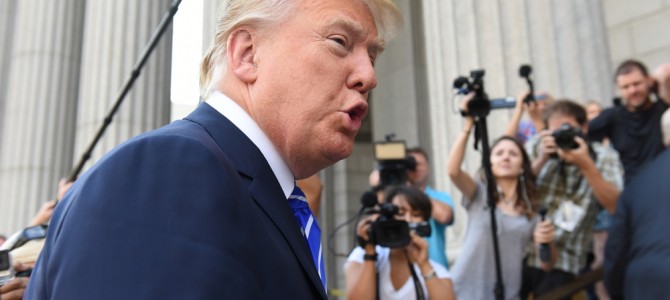Donald Trump has not had two weeks this bad since he got into the presidential stakes. His general election polling numbers tell the story: on January 31st, just two months ago, his RealClearPolitics polling average put Trump in a statistical dead heat with Hillary Clinton, trailing her 44-41 percent.
It was conceivable at that moment to see a realistic path for Trump not just to the Republican nomination but to the White House – that he redraws the map in challenging ways and would be a competitive campaigner at the least, even given the inevitable attacks of the Democratic machine. But that situation is no longer operative.
As it stands today, Trump is the only Republican who loses to Hillary Clinton by double digits. The two most recent polls, from Fox News and Bloomberg, find her up by 11 points and 18 points respectively. And a great deal of this has to do with Trump’s hardening opposition among women, particularly Republican women.
At the beginning of the Republican race, Trump was doing well among women, netting more than a third of their support. But a lot has changed since then – he peaked with Republican women in polling in December and has been declining ever since. His unnecessarily vulgar personal attacks – on Megyn Kelly, Carly Fiorina, and Heidi Cruz among others – almost certainly have something to do with that. But there’s something else going on recently which is hurting Trump: he’s not winning.
The slowdown in the primary schedule and the absence of other candidates to cajole and insult has put Trump in more of a spotlight for his weaknesses and defects, not his winning. The latest polling in Wisconsin shows Ted Cruz with a double digit lead – meaning that Trump could very well go from March 22nd to April 19th (the New York primary) without a single victory speech.
Victory speeches are more significant for Trump than they are for conventional candidates because they reiterate in the mind of the beholder his seriousness and viability. In their absence, he is reduced to humdrum campaigning – never very interesting stuff – and that puts his remarks in more of a spotlight, not allowing him to reset the message to one of his electoral prowess.
Trump’s abortion comments yesterday are a good example of what this means: where before he could reset the conversation with a win at the ballot box, following his foot in mouth suggestion that women who get abortions ought to be punished under the law (“isn’t that what you people want to hear?”), instead the conversation can dwell on the comment – leading to his attempt to quickly reverse course.
The damage from that type of comment, which manages to insult the deeply held beliefs both his independent supporters and his pro-life supporters, can be long-ranging and significant. It’s no accident they lead to mainstream media questions for Hillary Clinton, mostly about how awful Republicans are to women. Elected Republicans look at this picture, imagine in fear the potential to be campaigning next to Trump as the nominee and having him saying such lines from the stage, and shudder – not just because it will insult political independents, but because it will betray their base of pro-life supporters.
Larry Sabato’s Crystal Ball tells the story of the new conventional wisdom: that Trump’s electoral map would be absolutely devastating for the Republican Party, with an electoral outcome of 347-191. This sort of scenario puts elected Republicans in mortal fear for their own job prospects – and that’s what would motivate them to throw caution to the wins in Cleveland and do whatever is necessary to block Trump as the nominee. The most important thing to any politician is their own job.
People may be underestimating how much of a problem it is for Trump that most RNC delegates will not personally be fans of Trump.
— Nate Silver (@NateSilver538) March 31, 2016
The point at which Trump puts the House and Senate in play does not matter to him – he doesn’t give any indication that he cares about the prospects of the party or who he would be dealing with as president – but it matters a great deal to Republican donors, elected officials, and the class that guides the party. If they become convinced they could lose one or both houses because of Trump, they will throw out the rulebook to stop him, whatever the cost.









